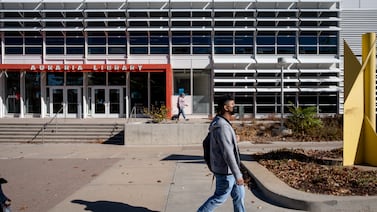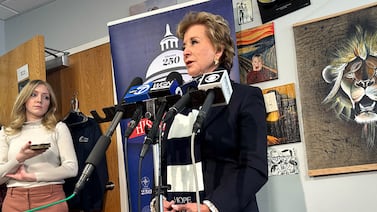Sign up for Chalkbeat Chicago’s free daily newsletter to keep up with the latest education news.
Mayor Brandon Johnson’s administration floated a plan for Chicago Public Schools to borrow up to $300 million to help pay for increased salary and some pension costs next year, Chalkbeat has learned.
But CPS leadership balked at the idea — calling it a “fictional or phantom revenue source” — and pushed back on City Hall’s request, according to an internal memo obtained by Chalkbeat and multiple sources familiar with their discussions.
The internal CPS memo, dated July 8, outlines the risks of borrowing to pay for hypothetical 4% raises for teachers and principals and cover a $175 million pension payment that was shifted to the school district by former Mayor Lori Lightfoot.
If the district covered those raises and pension payments, the district’s projected deficit would grow to $933 million for next fiscal year, the memo said. Borrowing $300 million to pay for expenses this year “only shifts the problem” to the following year and will mean higher costs to pay off debt down the line, the memo said.
The mayor’s office did not comment on the suggestion to borrow money, but said in a statement that the district has limited options to close its budget gap. It said the mayor supports the “cost-saving measures and operational efficiencies,” but is not supportive of cuts to critical staff and is having conversations to solve the district’s financial challenges.
Loan suggestion comes amid CPS budget challenges
CPS had roughly $9.3 billion in outstanding debt as of June 1, and its debt-service obligations already divert hundreds of millions of dollars away from classrooms every year. Officials included more than $800 million in debt payments in the district’s proposed $9.9 billion operating budget announced earlier this week. The proposal would close a $505 million shortfall — driven largely by the end of federal COVID money — through cuts at the district’s central office and staffing, as well through restructuring some existing debt and federal grants.
The proposed budget does not include any new borrowing, or factor in the costs of new bargaining agreements that are being negotiated now, including with the Chicago Teachers Union.
Johnson blasted that budget proposal Thursday. In a statement Friday, his office said he supported how the district proposed to close its budget deficit and called the new school funding formula “promising,” but said there is “still more work to be done.”
The teachers union called the budget proposal “an act of make-believe.” The Board of Education is expected to vote on the budget proposal later this month.
Johnson, the teachers union, and CPS had unsuccessfully pushed state lawmakers to provide more money to the district in order to help close its funding gap. While state funding for Chicago schools has increased since 2017, CPS would need another $1 billion to be considered “adequately funded” under the state’s school funding formula. However, the internal memo notes that in the past, CPS used deficit spending “as a strategy to increase pressure on the state for additional state funding, but it never worked.”
A district spokesperson declined to comment on the loan suggestion, except to say that CPS has not taken on a loan to balance its budget.
“We will continue to collaborate with City leaders, our labor, civic and community partners, to find solutions to the long-standing public education funding challenges so we can best support our students’ continued success,” CPS spokesperson Mary Ann Fergus said in a statement.
The union also took issue this week with the district’s overall proposed budget.
“As we review this budget proposal, it is clear that CPS leadership has failed to take steps to guarantee our students and their families what they need to dream, achieve and thrive,” CTU President Stacy Davis Gates said in a statement Wednesday.
Earlier in the month, the union decried layoffs of at least 330 of its members amid a new approach to how the district funds its schools. Those members will likely be rehired at other schools, but the layoffs caused disruption for teachers and school communities, CTU said.
The union did not comment specifically on the issue of a loan. In a statement, Vice President Jackson Potter said CPS CEO Pedro Martinez is “shirking his responsibility” to build a budget that provides a quality education, especially for families on the South and West sides, and the union expects CPS, the city, and state “to find real solutions and work together to craft a budget that provides stability, equity, and quality.”
The principals union said in a statement that City Hall’s suggestion for a loan “is not the answer.” The union also expressed concern that officials are estimating an $8 million cost for its contract, given that negotiations are ongoing.
The union said that the current budget is partly driven by the burden of previous borrowing, and that budget obligations “should not be satisfied on the backs of our students.”
Past pension cost shift at center of disagreement over borrowing
City Hall’s suggestion that CPS borrow money is tied in part to pension payments for the retirement of CPS staff that are not teachers through the Municipal Employees’ Annuity and Benefit Fund of Chicago, according to the July 8 CPS memo. The city used to cover this cost through its own budget, but Lightfoot began shifting that cost to CPS, starting with a $60 million payment in 2020, a move that Johnson and the CTU criticized at the time.
Now, under Johnson as mayor, City Hall wants CPS to cover $175 million of the pension payments, the memo says. That’s the same amount the district contributed last year.
In addition to the pension payments, the suggested borrowing would help cover $120 million in increased costs associated with a new Chicago Teachers Union contract. Another $8 million would be for costs related to the first contract under Chicago’s new principals union, the memo says. Both contracts are still in negotiations.
In all, under City Hall’s proposed loan plan, the district would take on $284 million in new expenses to be covered with borrowed money that would be paid off over the next 20 years.
In the memo, which analyzes City Hall’s proposal for the Board of Education, district officials warned that while borrowing money could solve an immediate problem, the district is still projecting deficits in future fiscal years.
Taking out a loan could also damage the district’s already low bond ratings, the memo said. Even with recent rating upgrades, CPS is still “the largest junk bond issuer in the United States,” according to the memo.
A low bond rating is similar to a bad credit score. It makes it more expensive for the district to borrow money to fund its capital budget, which is used to improve or build new school facilities, the memo said.
“This could be thought of as putting your credit card payments that you can no longer afford on your mortgage payments,” the memo said. “It allows cash to be freed up for other expenses, but it seeds a costly legacy of future amounts of larger debt to be paid back and it does not solve the issue of being fiscally responsible.”
The memo is accurate about the impact of taking out a loan to cover operating costs, said Joe Ferguson, president of the Civic Federation, a nonpartisan government watchdog organization, who is also Chicago’s former inspector general.
Additionally, it’s not clear how CPS would balance its budget in future years, given the increased borrowing costs, Ferguson noted. The type of loan described in the memo is akin to a payday loan, where interest rates are very high, he said.
“One of the ironies here is that, CPS — long derided and criticized for irresponsible practices — in this moment is endeavoring to be the responsible actor,” by closing its deficit through various cuts and debt restructuring, Ferguson said.
Chicago Public Schools has a long history of borrowing to pay expenses, including risky bond deals during the 2000s that saddled the system with more long-term debt. The Chicago Teachers Union became a vocal critic of the district’s borrowing practices after the Chicago Tribune’s reporting on the issue in 2014.
When the district faced deficits between the 2014 and 2017 fiscal years, CPS borrowed money to cover operating expenses since administrations at the time didn’t want to cut costs. The district owes $3.7 billion in principal and interest payments for that borrowing, the memo said.
The recently proposed budget is about 75% larger than a decade ago, when CPS had a $5.6 billion operating budget. Johnson has lobbied board members to approve the loan plan, but the board “is remaining firm in their pushback,” according to one source with knowledge of the conversations.
Chalkbeat Chicago Bureau Chief Becky Vevea contributed.
Reema Amin is a reporter covering Chicago Public Schools. Contact Reema at ramin@chalkbeat.org.






